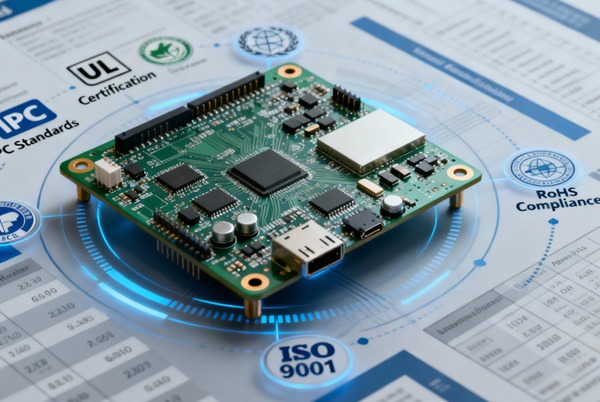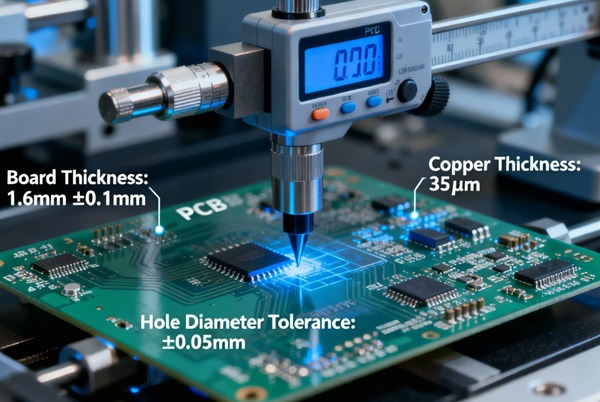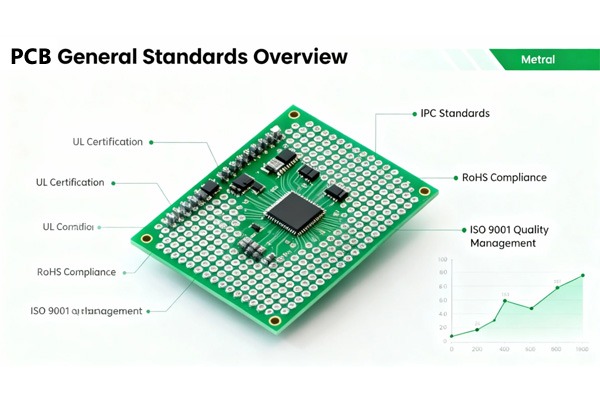Printed Circuit Boards (PCBs) serve as the core foundation of electronic devices, and their quality and reliability directly impact the performance of the entire electronic system. To ensure consistency and reliability throughout the PCB design, manufacturing, assembly, and testing processes, the industry has established a series of universal standards. This article systematically outlines key PCB-related standards, covering multiple critical stages such as Material Selection, Process Flow, Quality Control, and Environmental Requirements, helping engineers and manufacturers comprehensively enhance product compliance and performance.
Table of Contents
Section 1: Design and Material Standards
1. IPC-6010 Series: Quality and Performance Specifications
- IPC-6018A: Specifies performance and qualification requirements for high-frequency microwave PCBs, applicable to communication and radar systems.
- IPC-D-317A: Design guidelines for high-speed circuit packaging, covering electrical and mechanical design considerations to ensure signal integrity.
2. Material Standards
- IPC-4101: Specifications for rigid PCB substrates, defining the performance parameters of laminates.
- IPC-4204: Standards for flexible circuit board materials, suitable for bendable electronic devices.
- IPC-SM-840: Quality certification for solder masks, ensuring soldering precision and insulation performance.
Section 2: Process and Manufacturing Standards
1. Soldering and Cleaning
- IPC-J-STD-001: Requirements for soldering processes, covering both manual and automated soldering.
- IPC-A-610: Acceptability criteria for electronic assemblies, widely used in quality inspection.
- IPC-CH-65-A: Cleaning guidelines, introducing environmentally friendly cleaning agents, and process control methods.
2. Stencils and Coatings
- IPC-7525: Guidelines for solder paste stencil design, optimizing SMT process precision.
- IPC-CC-830B: Performance certification for insulating compounds, ensuring coating protection reliability.
3. Thermal Management and Reliability
- IPC-7530: Guidelines for reflow and wave soldering temperature profiles, preventing thermal damage.
- IPC-7095: Design and process supplements for BGA devices, addressing high-density packaging challenges.

Section 3: Assembly and Inspection Standards
1. Assembly Specifications
- IPC-AJ-820: Handbook on assembly and soldering techniques, covering through-hole and surface mount technologies.
- IPC-HDBK-001: Guidelines for soldering operations, providing practical advice and troubleshooting.
2. Inspection and Testing
- IPC-TM-650: Standardized test methods, including solderability, insulation resistance, etc.
- IPC-9252: Electrical test standards for bare boards and assembled boards.
- IPC-9201: Surface Insulation Resistance (SIR) testing, evaluating environmental durability.
Section 4: Environmental and Safety Standards
1. Hazardous Substance Control
- IPC-1752: Material declaration standards, complying with RoHS and REACH requirements.
- J-STD-004/005: Specifications for halogen-free fluxes and solder pastes, promoting green manufacturing.
2. Cleaner Production
- IPC-1401: Supply chain social responsibility standards, focusing on environmental and ethical aspects.
- IPC-SC-60A: Solvent cleaning handbook, reducing Volatile Organic Compound (VOC) emissions.
Section 5: Industry-Specific Standards
| Application Field | Standard Number | Key Content |
|---|---|---|
| Automotive Electronics | IPC-6012DA | High-reliability PCB performance requirements |
| Aerospace | IPC-6011DS | Durability testing for extreme environments |
| Medical Devices | IEC 60601-1 | Safety and Electromagnetic Compatibility (EMC) |
| Consumer Electronics | IPC-2221B | General design specifications and cost optimization |

Section 6: Future Trends and Innovations
- High-Density Interconnect (HDI): IPC-6016 regulates HDI PCB processes.
- Flexible Hybrid Electronics (FHE): IPC-J-STD-1776 promotes the development of wearable devices.
- Smart Factories: IPC-CFX (Hermes standard) enables IoT integration in production lines.
Conclusion
Printed Circuit Board standards form the cornerstone of the electronics manufacturing industry, covering the entire lifecycle from Material Selection to End Products. By adhering to authoritative standards such as IPC, IEC, and JEDEC, companies can enhance product consistency, reliability, and market competitiveness. As technology evolves, new-generation standards will continue to drive PCBs toward Higher Frequencies, Miniaturization, and Green Manufacturing.
